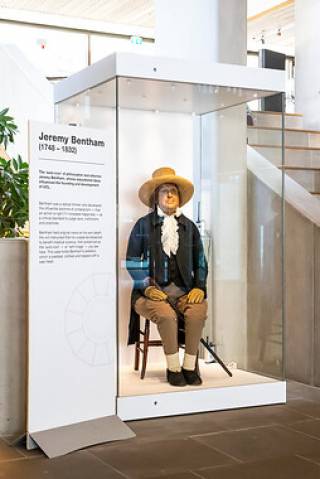Libby Randall, final year BA History student, writes about the legacy of Jeremy Bentham.
Jeremy Bentham is accredited as the ‘spiritual father’ of UCL, his work in law and philosophy has inspired the university’s founders and shaped the moral basis on which the institution stands. He is best known for his progressive thinking, the concept of Utilitarianism and his dead corpse on display inside a glass case at UCL…
But before that we get onto that, let’s take a brief look at the legacy of the man himself. UCL takes pride in being the first UK university to accept students regardless of gender, class or religion, pioneering a move towards inclusivity within higher education. The influence of Bentham here cannot be overlooked; he strongly believed education should be accessible by those of all races and political beliefs. Furthermore his 1789 Utilitarianism promotes the moral theory that the best actions result in the least suffering. An 18th century advocate of women’s rights, freedom of expression and the decriminalisation of homosexuality, Bentham encapsulates many core beliefs still held by the university today.
But yes, his dead body is in a glass box. Most commonly referred to as the ‘Auto-Icon’, Bentham’s skeletal remains have been kept at UCL since 1850 and are currently on proud display at the Student Centre. The figure wears underwear, two pairs of socks and one of Bentham’s own suits. It also has hinges at the joints, so could in theory be moved around to scare people but of course, this isn’t done in actuality and he’s really quite delicate.
 Close
Close


